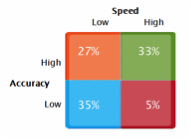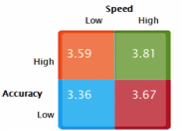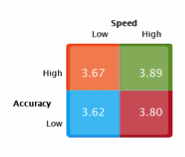If you ask a group of HR professionals whether they think HR should go faster, you get mixed results.
Half the group is excited about the idea, and they welcome the opportunity to speed up their own work. They hope to be more responsive to the employees and managers they support who are also being compelled to move at a faster pace. The other half of the room looks at you with a quizzical expression.
The big question on the minds of those who are unsure is whether going fast results in errors. HR is a function that often is focused on avoiding lawsuits, making sure data are accurate, and therefore the notion of going faster worries many.
In order to learn more about Fast HRM, the summer, 2010 Leadership Pulse included two questions on speed and accuracy of HRM (see www.leadershippulse.com). The leadership work is an ongoing learning initiative that focuses manager dialogue on current business metrics. The topics of the learning were leadership confidence and Fast HRM.
The questions asked in the Leadership Pulse Dialogue were framed as follows:
Introduction to the section:
We are doing quite a bit of work on what we call Fast HRM. It is about fast and agile human resource management (HRM). Below are three questions about this topic
1. Please tell us how you would rate the speed at which your human resources function (if you are a small firm and do not have a department, please think about the way HR services are delivered to you personally) provides HR services to you.
Response scale is 1 to 7, where 1=painfully slow; 2=very slow; 3=slow; 4=average; 5=fast; 6=very fast; 7=incredibly fast.
2. Next, please tell us how well those same services are provided in terms of accuracy.
Response scale is 1 to 7, where 1=always inaccurate; 2=very inaccurate; 3=inaccurate; 4=average; 5=accurate; 6=very accurate; 7=incredibly high accuracy
3. Please take a few minutes to tell us what HR process or tool you would suggest speeding up in your organization. Assume for the sake of this question that speeding up the process will not diminish the quality or accuracy of the end product that you need. Thank you for your help in this work.
A total of 677 people participated in this Leadership Pulse.
Sample comments:
- “HR reacts slow and indecisive most of the time, leaving our review process and reward system problematic.”
- “We need to speed up hiring. Very cumbersome for the hiring manager.”
- “No foreseeable hope for them”
- “Reviews take too long because we have multiple tools that we need to interface throughout the process.”
- “Maybe it’s a communication issue, but it just feels like things that are worked on by HR are just very slow processes”
The comments (of which what is above is only a small sample) tell a compelling story of the need for HR to speed up. Next, the empirical data are reviewed.
What do the Empirical Data tell us?
In order to evaluate the results of the quantitative questions, we ran some statistical models and then represented the results of the data analysis by creating a 2 x 2 with the two questions on fast and accurate HRM.
Answers were coded “low” on both scales if the respondent answered from 1 to 4 on the question (slow and inaccurate answers or neutral), and “high” if the individual provided a score of 5 to 7 (fast and accurate responses).

The plot showing the percent of people in each quadrant is here (see right):
Note that 62 percent report slow HRM, while 38 percent report fast HRM. Only one third of the sample, 33 percent, reports an HR group that is both fast and accurate. We next plotted two variables in the 2 x 2 boxes. The first was overall confidence and the second is firm performance.
Figures 2A and 2B shows confidence and firm performance scores for the speed and accuracy quadrants (to see more detail on the confidence questions go to www.leadershippulse.com and see the reports page).

In both cases, the highest scores on leadership confidence and firm performance are attributed to those who say their HR groups are both fast and accurate. However, the second highest scores (in the red box in both) indicate that speed is more important than accuracy.
The upper left (orange) is the third highest scoring group where HR is slow and accuracy is high. The lowest scoring group (blue box) has low scores on both speed and accuracy. What’s even more interesting is what happens when we examine the sample of respondents who are working in HR (vs. in other functional areas). The HR respondents say that they are most confident when HR is fast and low on accuracy.

This is consistent with the comment data because some of the most passionate pleas to go faster came from HR executives.
It’s time to go fast
The data on fast and accurate HRM reported in this article are not from a major scientific survey; however, the initial impetus to explore this topic is based on a much larger scale piece of work that involved intensive study of the drivers of overall firm performance.
Earlier research found that there were conditions under which having a senior HR executive report to the CEO (an indicator of HR being strategic) could have a very positive impact on firm performance and also a very negative impact on firm performance (see The human resource management effect on IPOs, Academy of Management Journal).
The earlier research, studying stock price and earnings growth, found that for fast-growth firms, having strategic HRM helped the firm be successful, but in slow growth firms, the HR executive effect was negative. That led to more research on what HR could possibly be doing to decrease stock price and earnings when a firm is going through no or slow change.
Case study data suggested that as fast-growth firms slowed down, more powerful HR groups (those run by HR executives who reported directly to the CEO) took the time to implement bigger and “heavier” HR systems. When this happens, it slowed the rest of the company down even further, thus, unintentionally contributing to bigger bureaucracy, less responsiveness, and slower organizations overall.
Today is not a time when HR can afford to do anything that slows down an organization. It’s time to not only examine what the HR department is doing. It also is critical to assure that all tools and processes being used are fast and nimble in order to help companies go faster to compete in the fast-paced markets that are speeding up more each day.
Want to learn more? If you want to learn more about Fast HRM or join us in a one-day workshop on the topic, contact info@eepulse.com. And you can learn more about Fast HRM at www.eepulse.com.